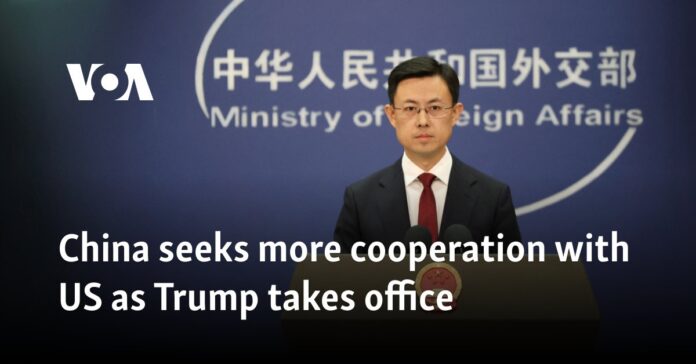China has urged the United States to focus on managing bilateral relationships through cooperation instead of confrontation as U.S. President Donald Trump kicks off his second term in office.
“China is willing to work with the new U.S. government to maintain communication, strengthen cooperation, properly manage differences, and push China-U.S. relations to make greater progress from a new starting point,” Chinese foreign ministry spokesperson Guo Jiakun said during the regular press conference on Tuesday in Beijing.
Analysts say Beijing hopes to reduce misunderstandings between both sides through engagement and exchanges in the early stage of the second Trump presidency.
“The Chinese government hopes China and the U.S. could understand each other’s needs through communication,” said Shen Dingli, a Shanghai-based international relations scholar.
“Beijing believes China and the U.S. can still reach a consensus and avoid many misunderstandings that have arisen during the first Trump presidency” if both sides prioritize efforts to stabilize bilateral relations, he told VOA by phone.
Ahead of Trump’s inauguration on Monday, China and Trump’s team conducted several top-level exchanges, including a call between the new U.S. president and Chinese President Xi Jinping last Friday.
Trump said he and Xi would “solve many problems together” while the Chinese president said the key to handling bilateral relations was to “respect each other’s core interests and major concerns and to find a proper solution to the problem.”
On Sunday, China’s Vice President Han Zheng, who was in Washington, D.C., to attend Trump’s inauguration ceremony, met with his American counterpart JD Vance, and a group of American business leaders, including Tesla founder Elon Musk.
He said China and the U.S. could “contribute to each other’s progress, bring benefits to the two countries, and make important contributions to world peace and development” as long as they “uphold the principles of mutual respect, peaceful coexistence and win-win cooperation.”
Additionally, Han urged U.S. businesses to “play an active role as a bridge and make greater contribution to the development of China-U.S. relations” by continuing to “invest and take root in China.”
Experts say Beijing wants to seize the opportunity to improve bilateral relations with Washington through these initial engagements with the Trump administration.
Beijing “would not only prefer to avoid increased sanctions but also the potential for greater limitations on tech exports to China,” said Timothy Rich, a political scientist at Western Kentucky University.
While the Chinese government has expressed willingness to cooperate with the Trump administration, the U.S. president has also held off the imposition of tariffs on imported goods from China, Mexico, and Canada.
Instead, he released a broad trade memo that urged the United States Trade Representative to assess China’s compliance with the “Phase 1” trade deal that his administration signed with Beijing in 2020, which required Beijing to increase purchases of U.S. exports by $200 billion over two years.
Additionally, Trump signed an executive order that would delay the ban on the popular social media app TikTok for 75 days but threatened to impose tariffs on Chinese products if Beijing didn’t approve a potential deal with TikTok.
“And if we said, well, ‘You’re not going to approve it’, then that’s a certain hostility, and we’ll put tariffs of 25, 30,40, 50%, even 100%,” Trump said on Monday, after signing the executive order for TikTok.
Rich said Trump’s decision to delay imposing tariffs on Chinese products shows the U.S. president’s desire to “pressure China to make some concessions” that he can declare as a victory.
“I suspect the talk of sticking it to China will return in the absence of some face-saving concession or if other policies start to falter, as a perceived tough-on-China stance taps into the broader concern among many Americans,” he told VOA in a written response.
Some Chinese merchants said Trump’s decision to delay the imposition of tariffs on Chinese products allows them to be better prepared for similar scenarios in the future.
“I am finding other ways to export products to my American customers by shifting operations to Southeast Asia,” a Chinese apparel exporter surnamed Yuan in Shanghai, who asked to be identified only by his last name due to security concerns, told VOA in a written response.
While Trump’s incoming cabinet includes several politicians known for their hawkish stance on China, including Secretary of State Marco Rubio, analysts say it’s unclear how the Trump administration’s China policies will shape up.
“The ultimate decision-maker is Trump, and if China gives Trump what he thinks he needs, those hawkish people and their beliefs will quickly be sidelined and they may not have influence on U.S.-China policy,” Dexter Roberts, a nonresident senior fellow at the Atlantic Council’s Global China Hub, told VOA by phone.
Despite the lack of clarity on the Trump administration’s China policies, Shen in Shanghai said official comments from Beijing and Washington suggest their initial exchanges have been “quite positive.”
“This might mean there would be less misunderstandings and I think both sides won’t waste this new opportunity to engage with each other,” he told VOA.

